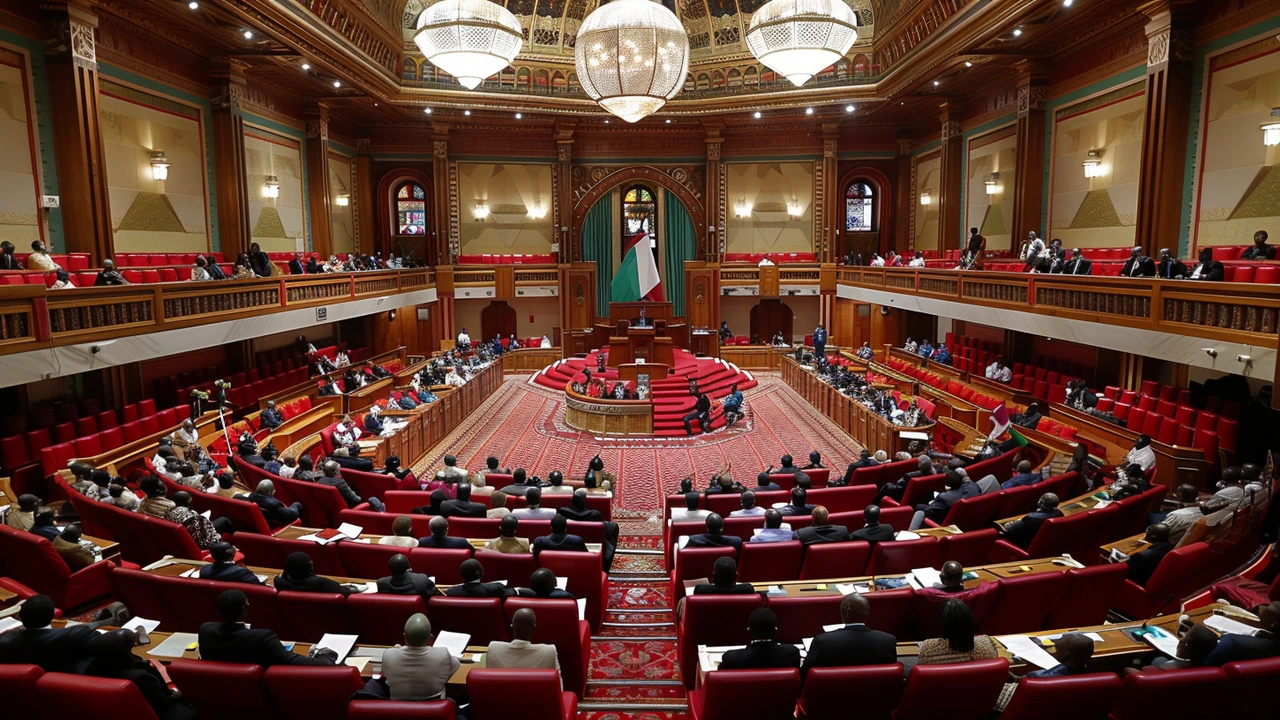Kenya’s High Tax Burden Risks Economic Growth, Expert Warns
As Kenya grapples with economic challenges, an increasing number of voices are speaking out about what they see as a significant roadblock to prosperity: the country's high and complex tax regime. Prof. XN Iraki, an economist at the University of Nairobi, has raised concerns that Kenya's present tax policies are stifling economic growth and turning businesses towards the informal sector. This shift is not just a minor hiccup but a fundamental issue that risks the country’s economic stability and the well-being of its citizens.
Businesses going underground to avoid taxes is not new, but the scale at which this is happening in Kenya is alarming. According to Prof. Iraki, the high tax burden is driving many legitimate businesses into the grey or even black markets, where they operate off the books and away from the prying eyes of tax authorities. This underground economy is not accounted for in official statistics, thereby depriving the government of the much-needed revenue to fund essential services and development projects.
Complex Tax System Contributing to Evasion
The issue is not just the high taxes but also the complexity of Kenya's tax regime. Multiple and sometimes overlapping tax obligations mean that even willing taxpayers find it challenging to comply. This complexity creates fertile ground for tax evasion, as businesses and individuals choose to navigate the labyrinthine system by simply not participating in it. Prof. Iraki noted that the tax-to-GDP ratio in Kenya stands at 18.3%, which is significantly higher than the African average of 15.5%. While a high tax-to-GDP ratio could indicate a capable tax authority, in Kenya's case it seems to be pushing the economy the wrong way.
Revenue Shortfalls and Missed Targets
The Kenya Revenue Authority (KRA) has missed its revenue collection targets for the past two financial years, underscoring the gravity of the situation. For the 2022-2023 financial year, the KRA had set an ambitious target to collect KES 2.3 trillion. However, it fell short, collecting only KES 1.9 trillion. This shortfall has significant implications for government operations, from infrastructural projects to social services, all of which rely heavily on tax revenue for funding.
Prof. Iraki's comments come at a crucial time when the government is under pressure to shore up its finances. The economist argues for a reduction in taxes to encourage compliance and enhance economic growth. He suggests that a lower tax rate could entice businesses to operate within the formal sector, thereby broadening the tax base and ultimately increasing revenue. The logic here is simple: a smaller slice of a larger pie could yield more significant results than a larger slice of a shrinking pie.
The Informal Sector: A Challenge and an Opportunity
The informal sector in Kenya is vast and varied, ranging from small-scale traders to substantial businesses operating off the grid. While this sector provides employment and sustenance to a significant portion of the population, its growth at the expense of the formal sector presents challenges. Informal businesses typically do not pay taxes, hire workers informally, and often circumvent labor laws. Hence, while they serve an essential role, their prominence can undermine formal economic structures.
Bringing these businesses into the formal economy is not just a matter of regulation but also of creating an environment where it is beneficial for them to do so. Lowering taxes could be one step in this direction. By reducing the tax burden, the government could pave the way for more businesses to formalize their operations. Once these businesses are within the formal sector, they can be more easily regulated, and their contributions can be more accurately accounted for.
Recommendations for Policy Changes
Based on Prof. Iraki's insights, there are several policy changes that the government could consider to address this issue. First, there needs to be a simplification of the tax code to make compliance easier and less cumbersome. A simpler tax regime would reduce the administrative overhead for businesses and could reduce the opportunities for evasion.
Second, a reduction in tax rates could encourage higher compliance and expand the tax base. While this might seem counterintuitive, evidence from other countries suggests that lower taxes can lead to higher overall revenue, as they reduce the incentive to evade taxes.
- Tax incentives for businesses that formalize their operations could also be considered. These could be in the form of lower tax rates for a specified period or tax breaks for businesses that register and comply with tax obligations.
- Enhanced enforcement measures could help to catch and prosecute tax evaders. However, these measures should be accompanied by efforts to make compliance easier and less costly, so businesses have less incentive to operate underground.
- Public awareness campaigns to educate businesses and individuals about the benefits of tax compliance and the risks of evasion could also be beneficial.
The Broader Implications
The issues raised by Prof. Iraki go beyond revenue collection. They touch on the broader implications for Kenya's economic growth and development. High taxes and a complex tax system deter investment and innovation, as businesses spend more time and resources on tax compliance instead of growth and development. By addressing these issues, Kenya could create a more conducive environment for business and economic growth.
Also, it is important to note that high taxes can exacerbate inequality. In a country where many people already struggle to make ends meet, high taxes can further deepen financial hardships. By lowering and simplifying taxes, the government would be taking a step towards more equitable economic policies that benefit all citizens, not just the wealthy who can afford to navigate the complex tax system.
A Call for Action
Prof. Iraki's warning should serve as a wake-up call for Kenya's policymakers. The need for tax reform is urgent, and the benefits of such reforms could be far-reaching. Ensuring that businesses can thrive in the formal sector would not only boost government revenues but also foster economic stability and growth. It is time for a tax policy overhaul that puts the needs of the economy and the people at its heart. The future of Kenya's economic growth depends on it.






abi rama
June 11, 2024 AT 18:03We’ve seen a lot of talk about tax pain, but the reality is that a lighter load can actually boost jobs and keep small shops open. When people stop worrying about every extra shilling, they can focus on growing their business. Crazy how a tiny policy tweak can ripple through whole neighborhoods. The informal sector would still have a place, but fewer would feel pushed into the shadows. Bottom line: less tax pressure equals more energy for innovation.
Megan Riley
June 12, 2024 AT 21:49Honestly, the numbers speak for themselves-high taxes, complex rules, and a shrinking formal base! It’s like trying to navigate a maze while blindfolded, and many just give up. The KRA’s shortfall isn’t a mystery; it’s a symptom of an over‑burdened system. If we cut the rates, businesses might actually want to register-definately a win‑win for everyone. Let’s keep the conversation going, folks, and push for real reform.
Lester Focke
June 14, 2024 AT 01:36The fiscal architecture of Kenya, as delineated in recent policy briefs, exhibits an alarming confluence of rate intensity and procedural opacity.
Empirical evidence from the World Bank suggests that marginal tax increases beyond a critical threshold precipitate diminishing returns in revenue collection.
In the Kenyan context, the current tax‑to‑GDP ratio of 18.3% surpasses the continental average, yet the elasticity of tax base expansion remains negligible.
This paradox is attributable to the proliferation of compliance costs that deter formal enrollment.
Moreover, the multiplicity of levies-VAT, PAYE, excise, and sector‑specific duties-creates a labyrinthine reporting regime.
Small and medium enterprises, lacking sophisticated accounting infrastructures, encounter substantial hurdles in meeting these demands.
Consequently, many elect to operate within the informal sphere, where fiscal obligations are either minimal or entirely absent.
The resultant shadow economy not only erodes the tax base but also distorts macro‑economic indicators.
Government expenditure, predicated on projected revenues, suffers shortfalls that manifest as delayed infrastructure projects and constrained social services.
A rational policy response would entail a bifurcated strategy: reduction of headline rates coupled with a simplification of the statutory code.
By lowering the marginal tax rates, the incentive structure shifts in favor of compliance, encouraging previously reluctant entities to formalize.
Simultaneously, a streamlined code reduces administrative overhead for both taxpayers and the revenue authority.
Historical precedents in Estonia and Rwanda demonstrate that such reforms can engender a broadened tax base and enhanced compliance.
It is incumbent upon Kenyan policymakers to internalize these lessons and pursue a calibrated reform agenda.
Failure to do so risks entrenching inefficiencies that will impede sustainable growth for generations to come.
Naveen Kumar Lokanatha
June 15, 2024 AT 05:23I completely agree with the points raised about simplifying the code. When the rules are straightforward, compliance becomes less of a burden for small businesses.
This can naturally expand the tax base without heavy enforcement.
Moreover, a clearer framework can improve trust between the private sector and the revenue authority.
It’s a win‑win for both growth and fiscal stability.
Alastair Moreton
June 16, 2024 AT 09:09Tax reform is overdue.
Surya Shrestha
June 17, 2024 AT 12:56While your succinct remark captures a general sentiment, it is imperative to underscore that reform must be meticulously calibrated; otherwise, hasty reductions may precipitate fiscal deficits.
A comprehensive audit of existing levies, coupled with stakeholder consultations, would provide the empirical foundation for a sustainable overhaul.
In sum, the urgency you articulate should be matched by a methodical and data‑driven approach.